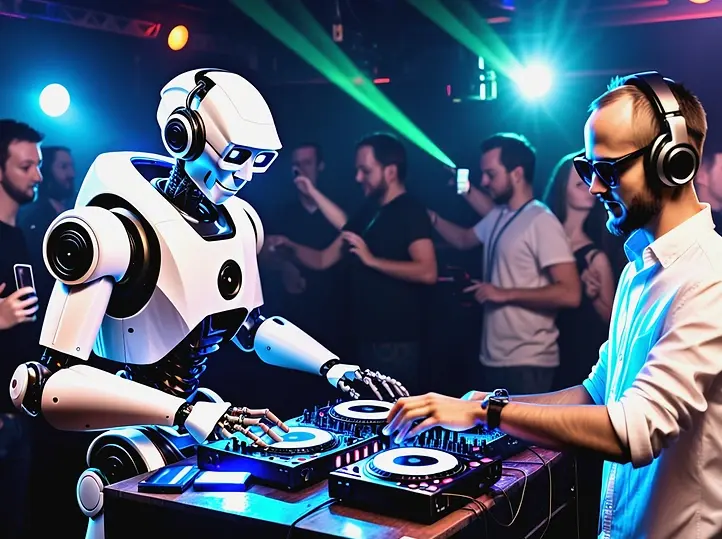Will AI Replace Musicians?
- Music Trendz

- Aug 14, 2024
- 4 min read
Updated: Nov 27, 2024

Will AI Replace Musicians?
The rise of artificial intelligence (AI) in the music industry has sparked numerous discussions and debates. Many people wonder if AI will eventually replace musicians altogether. While AI has made significant strides in music production, it's essential to understand its current capabilities and limitations.
AI can compose music, generate melodies, and even mimic the styles of famous artists. Platforms like OpenAI's MuseNet and Google's Magenta have demonstrated that AI can create impressive pieces of music. However, these compositions often lack the emotional depth and personal touch that human musicians bring to their art. Music is not just about notes and rhythms; it's about expressing emotions, telling stories, and connecting with listeners on a personal level.
Furthermore, live performances and the unique charisma of human musicians are irreplaceable. AI can assist in the creative process, but it cannot replicate the spontaneous energy and interaction that occur during a live show. Musicians also draw inspiration from their life experiences, cultural backgrounds, and emotions—elements that AI lacks.
Can AI Replace Musicians?
While AI has proven to be a valuable tool for musicians, it is unlikely to replace them entirely. AI can aid in various aspects of music creation, such as generating ideas, suggesting chord progressions, and even automating repetitive tasks. However, the role of a musician extends beyond just creating music. Musicians often engage with their audience, perform live, and build a personal brand that resonates with their fans.
AI can enhance the creative process by offering new possibilities and expanding the boundaries of what is musically possible. For instance, AI can analyze vast amounts of data to identify trends and patterns, helping musicians stay relevant in a rapidly changing industry. It can also assist in producing high-quality recordings, reducing the time and effort required for post-production.
Ultimately, AI should be viewed as a collaborator rather than a replacement. By leveraging AI tools, musicians can push their creativity further and explore new musical territories. The synergy between human creativity and AI technology can lead to innovative and exciting musical experiences.
Will AI Replace Composers?
The question of whether AI will replace composers is closely related to its potential impact on musicians. AI has shown remarkable abilities in composing music, with algorithms capable of generating intricate and stylistically diverse pieces. However, the essence of composition lies in the human touch.Composers draw inspiration from their emotions, experiences, and cultural contexts. They craft music that reflects their unique perspectives and resonates with listeners on a profound level. While AI can emulate certain aspects of composition, it lacks the depth of human experience and the ability to convey genuine emotion.AI-generated compositions can serve as a starting point or a source of inspiration for human composers. They can provide fresh ideas, explore unconventional musical structures, and even break creative blocks. However, the final artistic decisions and the emotional nuances that make a piece truly compelling will always come from human composers.
Will Musicians Be Replaced By Robots?
The idea of robots replacing musicians might sound like science fiction, but advancements in robotics and AI have made it a topic worth exploring. Robots equipped with AI can play musical instruments with precision, replicate complex performances, and even interact with other musicians in real-time.However, the artistry of musicianship goes beyond technical proficiency. Musicians infuse their performances with passion, creativity, and a sense of individuality. They connect with their audience through their unique interpretations and emotional expressions. Robots, despite their technical capabilities, cannot replicate the human experience and the emotional depth that comes with it.Moreover, the music industry is deeply rooted in human culture and social interaction. Fans follow musicians not just for their music but also for their personalities, stories, and the connection they feel with them. This human aspect is irreplaceable and remains a vital part of the music experience.
Will AI Replace Artists?
The impact of AI on the broader category of artists, including visual artists, writers, and performers, is a subject of much debate. AI can create visual art, write stories, and even perform certain tasks traditionally done by artists. However, the role of an artist is inherently tied to human creativity and expression.
Artists use their medium to convey ideas, provoke thought, and evoke emotions. Their work is often a reflection of their inner world and the society they live in. While AI can generate art that mimics human styles, it lacks the personal experiences and cultural context that inform human creativity.
AI-generated art can be impressive and even commercially successful, but it does not replace the human element that makes art truly meaningful. Artists will continue to play a crucial role in society, using their creativity to inspire, challenge, and connect with others.
Conclusion
While AI has made remarkable advancements in the field of music and art, it is unlikely to replace musicians, composers, and artists entirely. AI can serve as a powerful tool to enhance creativity, provide inspiration, and assist in various aspects of the artistic process. However, the human touch, emotional depth, and unique perspectives that musicians and artists bring to their work remain irreplaceable.
The future of music and art will likely see a collaboration between human creativity and AI technology, leading to new and exciting possibilities. Rather than viewing AI as a threat, it should be embraced as a partner that can help artists push the boundaries of their craft and explore uncharted territories.




Comments